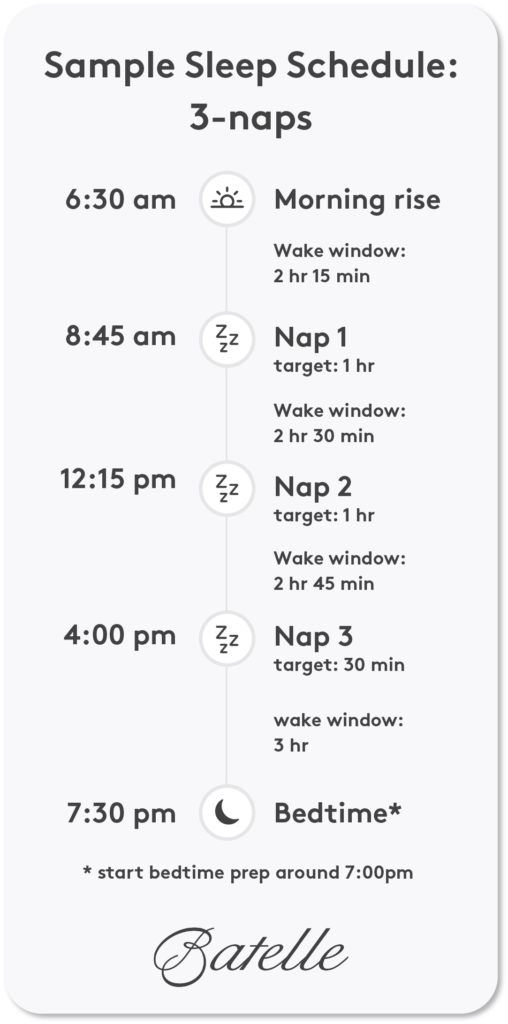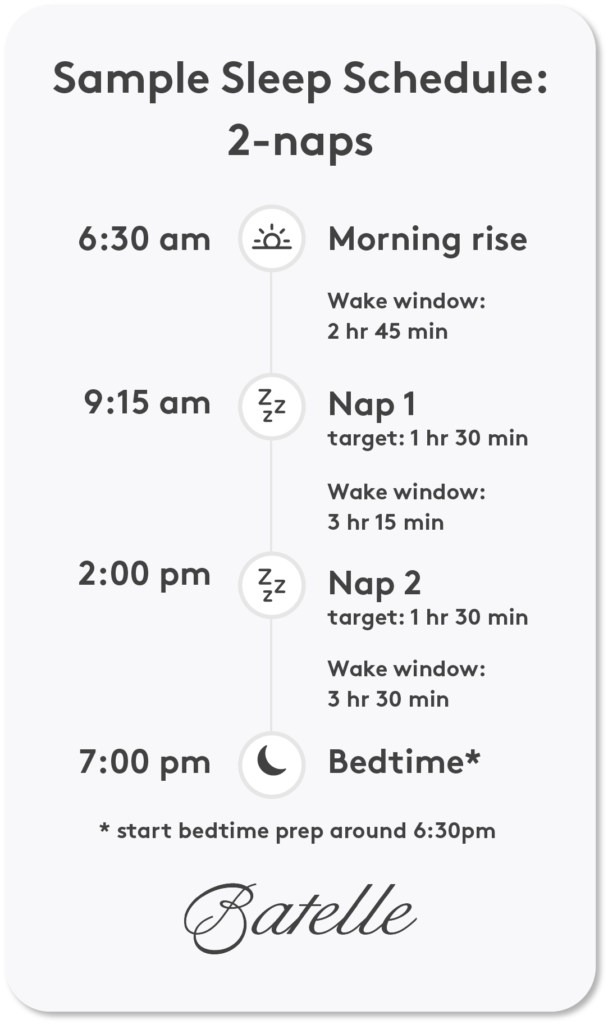
Seven months already! Time flies, doesn’t it? As your baby hits the 7-month mark, you’re likely noticing more changes in their sleep patterns and overall development. This is a pivotal time for sleep schedules as your little one becomes more active and curious during the day and (hopefully!) starts consolidating sleep at night. With the potential for longer stretches of sleep and evolving nap rhythms, navigating your 7-month-old’s sleep schedule requires flexibility.
In this blog post, we’ll explore the typical sleep needs of a 7-month-old, discuss the transition from three naps to two, and share tips on how to help your baby sleep for longer stretches at night. Let’s dive into the world of sleep for your growing baby and help you create a schedule that works for your family’s needs.


Keep in mind that the length of each nap can differ. Usually, the earlier naps in the day are lengthier, while the final nap is shorter, often just a brief catnap lasting about 30 minutes. Be sure to cap any single nap at no longer than 2 hours.
Cumulative daytime sleep should ideally total 2-3 hours, but this is just an average. Every child is unique, so if your little one seems content and well-rested with slightly more or less daytime sleep, that’s perfectly okay. It’s not necessary to focus too much on the exact numbers.
Most 7-month-old babies take 2-3 naps each day. Average wake windows for a 7-month-old baby are 2-3.5 hours. Little ones who tend to take longer naps will have longer wake windows, whereas those who take shorter naps tend to have shorter wake windows.
If your little one is still taking more than 3 naps each day, it may be time to increase their awake time between naps to increase sleep pressure and encourage longer naps. Additionally, it’s important to have a regular start time for the day. This can help you set a consistent time for the first nap, and the rest of the day will then follow suit.
The transition from three to two naps typically occurs between 6-8 months old. Some babies will drop their third nap earlier and some later, but to be ready for a two-nap schedule, your little one will need to be comfortable handling wake windows of 3-3.5 hours at a time.
It’s very normal for the late afternoon nap to be tricky. If you’re noticing resistance and you don’t feel that your little one is ready to handle at least 3 hours of awake time, try facilitating that last nap via contact napping in the carrier or your arms, nursing, or try a motion nap in the car or stroller.
Rather than simply dropping the third nap, think of this transition as lengthening the first two naps, along with the wake windows. The goal is to have two naps spaced out enough in the day so that the last wake window ahead of bedtime is not too long. This usually means that the middle wake window is about 3 hours, and your child is getting 2.5-3 hours of daytime sleep split between two naps.
Schedule fluctuation: Nap transitions can be tricky because it’s not as straightforward as flipping a switch. The transition will happen gradually in most cases, with some days being 3-nap days, and some being 2-nap days.
Early rising and frequent nighttime waking: It’s common for frequent night waking or early rising to happen at this time because daytime sleep may be less than ideal, which can cause your little one to be overtired at bedtime. Do your best to start the day no earlier than 6:00 am, and keep bedtime no earlier than 6:30 pm.
Barring any prematurity or weight-gaining issues, by the time a baby reaches 7 months old, their need for nighttime feedings often decreases. This can still vary from one baby to another. However, if your baby is waking up to feed more than twice a night, it’s a good idea to monitor their daytime feeding habits. The goal is for your baby to take most of their feeds during the day, which helps them sleep more soundly at night.
Evaluating whether night feedings are effective for your baby at this stage is important. Typically, a baby who wakes up due to hunger will return to sleep after being fed. However, if night feeds lead to increased wakefulness, possibly from overstimulation or a need to suck to get back to sleep, it may be beneficial to explore other comforting methods. This is especially true for breastfed babies, as they likely associate nursing with sleep, making it harder for them to stay asleep as they transition between sleep cycles.
In such cases, having the non-nursing parent respond to nighttime awakenings can be particularly effective. For instance, if your baby stirs at night, the non-nursing parent can gently reassure them by speaking softly and providing a soothing touch, perhaps with a gentle pat or stroke on their back. Humming a lullaby or softly speaking can also be calming. If these initial methods don’t work, this parent might hold and rock the baby or walk around the room with them.
Offering a feed should be a last resort, allowing the baby to learn other ways of settling back to sleep. This gradual increase in soothing techniques can help determine if each step is sufficient. While feeding remains an option, it isn’t the first solution to every wake-up.
Remember: Consult with your pediatrician before making changes to your baby’s feeding routine.
In addition to the schedule transitions that are common at this age, there are also developmental milestones occurring that can contribute to sleep regression. Not all sleep issues need to be worked on through formal sleep training. There are times when waiting for a while will result in sleep improving. However, if you’re still struggling after 2-3 weeks, or if you’re exhausted and unsure of what to do, sleep training can be a great place to start.
So there you have it, a rundown on your 7-month-old baby’s sleep schedule. As you guide your little one through this nap transition and work towards longer nighttime sleep, be patient and responsive to their individual needs. Whether exploring sleep training or adjusting routines, trust your instincts and know that these steps are part of fostering healthy sleep habits. This journey is not just about better sleep for your baby, but also about the well-being of your entire family. Here’s to peaceful nights and joyful days with your growing baby!
